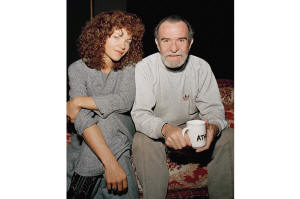South Africa's giant playwright Athol Fugard, whose searing works
challenged apartheid, dies aged 92
[March 10, 2025]
By MARK KENNEDY and GERALD IMRAY
CAPE TOWN, South Africa (AP) — Athol Fugard, South Africa's foremost
dramatist who explored the pervasiveness of apartheid in such searing
works as "The Blood Knot" and "’Master Harold’... and the Boys," has
died. He was 92.
The South African government confirmed Fugard's death and said the
country “has lost one of its greatest literary and theatrical icons,
whose work shaped the cultural and social landscape of our nation.”
Six of Fugard's plays landed on Broadway, including two productions of
“’Master Harold’... and the Boys,” in 1982 and 2003.
Because Fugard’s best-known plays center on the suffering caused by the
apartheid policies of South Africa's white-minority government, some
among Fugard's audience abroad were surprised to find he was white
himself.
“’Master Harold’... and the Boys” is a Tony Award-nominated work set in
a South African tea shop in 1950. It centers on the relationship between
the son of the white owner and two Black servants who have served as
surrogate parents. One rainy afternoon, the bonds between the characters
are stressed to breaking point when the young man begins to abuse his
elders.

“In plain words, just get on with your job," the boy tells one servant.
"My mother is right. She’s always warning me about allowing you to get
too familiar. Well, this time you’ve gone too far. It’s going to stop
right now. You’re only a servant in here, and don’t forget it.”
When it opened in Johannesburg in 1983 — at the height of apartheid — in
the audience was anti-apartheid activist Desmond Tutu. "I thought it was
something for which you don't applaud. The first response is weeping,"
Tutu, who died in 2021, said after the final curtain. “It's saying
something we know, that we've said so often about what this country does
to human relations.”
"The Road to Mecca," with its three white characters, touches on
apartheid of a different sort. It concerns an adventurous artist named
Miss Helen, at odds with and cut off from the rigid and unyielding
Afrikaners around her. It's her eccentric artwork that severs her from
society and makes her the subject of a fight for control.
A production opened in San Francisco in 2023, prompting the San
Francisco Chronicle's theater critic to note that “its central concern —
how to deal with people who are aging and alone — feels ripe for our own
moment of declining birth rates and increasing life expectancy amid a
fraying social safety net.”
Fugard once told an interviewer that the best theater in Africa would
come from South Africa because the country's "daily tally of injustice
and brutality has forced a maturity of thinking and feeling and an
awareness of basic values I do not find equaled anywhere in Africa."
Fugard was born in Middleburg in the semiarid Karoo on June 11, 1932.
His father was an English-Irish man whose joy was playing jazz piano.
His mother was Afrikaans, descended from South Africa's early
Dutch-German settlers, and earned the family's income by running a
store.
Fugard said his first trip into Johannesburg's Black enclave of
Sophiatown — since destroyed and replaced with a white residential area
— was "a definitive event of my life. I first went in there as the
result of an accident. I suddenly encountered township life."
[to top of second column]
|

Actress Amy Irving sits with actor-director-playwright Athol Fugard
during rehearsals of the play "The Road to Mecca" on Feb. 29, 1988
in New York. (AP Photo/Mario Cabrera, File)
 This ignited Fugard's longstanding
urge to write. He left the University of Cape Town just before he
would have graduated in philosophy because "I had a feeling that if
I stayed I might be stuck into academia."
Fugard became a target for the apartheid government and his passport
was taken away for four years after he directed a Black theater
workshop, "The Serpent Players." Five workshop members were
imprisoned on Robben Island, where South Africa kept political
prisoners, including Nelson Mandela. Fugard and his family endured
years of government surveillance; their mail was opened, their
phones tapped, and their home subjected to midnight police searches.
He hitchhiked through Africa in 1953 with South African poet Perseus
Adams, and ended up working as a sailor, the only white seaman on
his ship. Fugard's theater experience was confined to acting in a
school play until 1956, when he married actor Sheila Meiring and
began concentrating on stage writing. He and Meiring later divorced.
He married second wife Paula Fourie in 2016.
He took a job in 1958 as a clerk with a Johannesburg Native
Commissioner's Court, where Black people who broke racial laws were
sentenced, “one every two minutes.”
"We were absolutely broke. I needed a job and I needed information
on the pass system," Fugard said. His job included witnessing the
caning of lawbreakers. “It was the darkest period of my life.”
He got some satisfaction in putting a small wrench in the works, by
"shuffling up the charge sheets," delaying proceedings enough for
friends of the Black detainees to get them lawyers.
Fugard wrote, directed and acted in his early productions. On the
eve of the opening of "A Lesson From Aloes," at Johannesburg's
Market Theater, Fugard dismissed one of the three performers and
took the role himself.
Later in life, Fugard taught acting, directing and playwriting at
the University of California, San Diego. In 2006, the film “Tsotsi,”
based on his 1961 novel, won international awards, including the
Oscar for foreign language film. He won a Tony Award for lifetime
achievement in 2011.
More recent plays include “The Train Driver" (2010) and “The Bird
Watchers” (2011), which both premiered at the Fugard Theatre in Cape
Town. As an actor, he appeared in the films “The Killing Fields” and
“Gandhi.” In 2014, Fugard returned to the stage as an actor for the
first time in 15 years in his own play, “Shadow of the Hummingbird,”
at the Long Wharf in New Haven, Connecticut.
——
Kennedy reported from New York.
All contents © copyright 2025 Associated Press. All rights reserved
 |